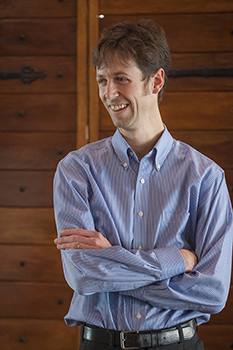Latest News Archive
Please select Category, Year, and then Month to display items
01 February 2024
|
Story Lacea Loader
|
Photo SUPPLIED
 Prof Prince Ngobeni, newly appointed Campus Principal of the UFS Qwaqwa Campus.
Prof Prince Ngobeni, newly appointed Campus Principal of the UFS Qwaqwa Campus.
The University of the Free State (UFS) has appointed Prof Prince Ngobeni as Principal of the Qwaqwa Campus as from 1 February 2024.
Prof Ngobeni completed his first qualification in Analytical Chemistry at the then Technikon North-West before furthering his studies at the then Technikon Pretoria. He completed a DTech in Chemistry at the Tshwane University of Technology (TUT) in 2003. In 2016, he enrolled for a Doctor of Business Administration in Higher Education at the University of Bath in England.
His lecturing career began at TUT in 1995 where he progressed from Head of Department: Chemistry in 2003 to Associate Dean: Faculty of Science in 2010, before being appointed as Executive Dean of the Faculty of Sciences at TUT in 2015 – a position he held until 2023. He also served as Interim Campus Rector of TUT’s Pretoria Campus from 2018 to 2020.
“With extensive years of academic leadership experience, Prof Ngobeni has the experience required to guide the Qwaqwa Campus towards the university’s Vision 130. The campus is already recognised as a leader in some of its unique research fields, and Prof Ngobeni’s strong research background will be valuable in this regard,” says Prof Francis Petersen, Vice-Chancellor and Principal of the UFS.
Prof Ngobeni is a member of several professional bodies in his field of expertise, including MatTEK at the Council for Scientific and Industrial Research (CSIR), the South African Chemical Institute (SACI), the Society for Atomic Spectroscopy, and the South African Council for Natural Scientific Professions (SACNASP). During his career, he has also secured research funding for individual projects and international partnerships. Prof Ngobeni also initiated chemistry practical sessions for local schools and participated in the Technology Station in Chemicals project, which offers a wide range of services designed to assist small and medium enterprises (SMEs) in the chemical sector.
His substantial list of publications in journals and books covers a range of chemistry-related and managerial topics. He is also a well-versed presenter at local and international conferences.
“The Qwaqwa Campus has experienced major developments in recent years; I look forward to further contributing to the growth of the campus and to support the university in achieving its Vision 130,” says Prof Ngobeni.
Stanford University hosts book launch for UFS Prestige Scholar
2015-12-14

Dr Christian Williams, a member of the Vice-Chancellor’s Prestige Scholars Programme, had his book launched by Stanford University. The book called National Liberation in Postcolonial Southern Africa: A Historical Ethnography of SWAPO’s Exile Camps will be available in South Africa early in 2016.
Photo: Sonia Small |
A launch for the much-anticipated book by Dr Christian Williams from the University of the Free State (UFS) was sponsored by the Humanities Center and the Center for African Studies of Stanford University in the USA, among others.
The launch of the book, National Liberation in Postcolonial Southern Africa: A Historical Ethnography of SWAPO’s Exile Camps, coincided with the 40th anniversary of Angola’s independence.
The book was published by Cambridge University Press in September 2015, and the launch at Stanford was on 16 November 2015.
This groundbreaking study, which will be available in South Africa early next year, has already been lauded for its invaluable contribution and the depth of its scholarship. The author is a senior lecturer in the Department of Anthropology of the UFS, and member of the Vice-Chancellor’s Prestige Scholars Programme (PSP). He is a former Fulbright scholar, and holds a doctorate from the University of Michigan in History and Anthropology.
National Liberation in Postcolonial Southern Africa follows members of the South West Africa People's Organization (SWAPO) through three decades of exile in Tanzania, Zambia, and Angola.
It highlights how different Namibians experienced exile, as well as the tensions that developed within SWAPO as Namibians encountered one another while officials asserted their power and protected their interests.
It also follows the return of Namibians who lived in exile to post-colonial Namibia, examining the extent to which divisions and hierarchies that emerged in the camps still continue to shape Namibians today.